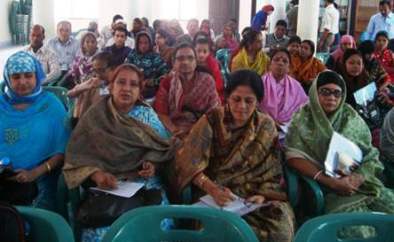To look at these issues, 63 participants attended a workshop on “Gender Awareness & Networking on Integrated Water Resources Management at Basin Level” on 28 November 2012.
The workshop was organized by the Center for Environmental and Geographic Information Services (CEGIS), Bangladesh Women & Water Network (BWWN), and GWP Bangladesh in Shunamganj under the auspices of the Surma Area Water Partnership
A presentation on the “IWRM Concepts & its Application: Bangladesh Perspective” outlined:
- Definition & Concepts of IWRM
- Why IWRM?
- Integration of IWRM in Various Sector
- Chronological History of IWRM
- Principles of IWRM
- Driving Forces & Challenges of IWRM
- Water Management System in Bangladesh
- Future challenges, prospects & vision of IWRM
- Lessons learned
A paper on “Mainstreaming Gender on IWRM” presented:
- Gender Concepts
- Gender & Development: Role of Government of Bangladesh
- Gender & Water: Government’s Policy
- Concept of IWRM and application of Gender
- Women’s employment for Economic Development
- Important issues to ensure women’s active participation and development
- Gender, Water & Networking
----------------------------------
Gender was in focus when a GWP delegation participated in the “International Conference on Fresh Water Governance for Sustainable Development” in KwaZulu-Natal, South Africa, on 5-7 November 2012. Read reports from the event here.

